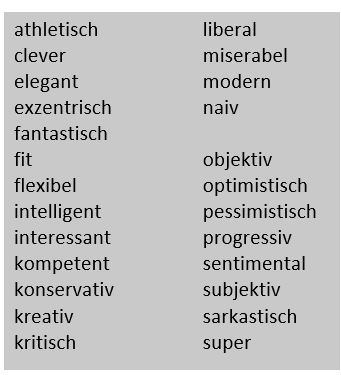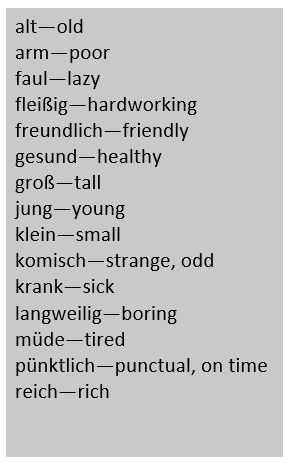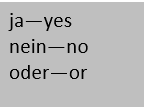4 Section 1-4
1-4: Adjectives and Negation
Many German adjectives that you might use to describe yourself are similar to English. The left-hand column lists several of these that you should easily be able to recognize without a dictionary. The right-hand column lists some that might not be as easy to understand at first glance.


Ich bin optimistisch, exzentrisch und fleißig.
English negates adjectives by placing the word “not” in front of them. Similarly, German does this as well with the word nicht. Place nicht in front of an adjective to negate it.
Ich bin nicht faul. I am not lazy.

Video: Negation of Adjectives. Click to watch me reteaching this.
Ex. A: Beschreiben Sie sich! (Describe yourself!) Describe yourself using the adjectives above. For example, if you are sick, you might say, “Ich bin krank.” If you are tired, you might say, “Ich bin müde.” Fill in the blanks with your own description.
(Audio courtesy of Wikimedia users Galaxy151 and Jeuwre, respectively, Creative Commons Attribution-Share Alike 4.0 International.)
Ich bin ___________, ___________ und __________.
Ich bin nicht ____________.
To make simple yes/no questions, German puts the verb first, just like in English.
Sind Sie sarkastisch? Are you sarcastic?
Ist der Computer neu? Is the computer new?
Video: Making yes/no questions in German. Click the link to watch me reteaching this concept.
Ex. B: Now ask your classmates about themselves using the adjectives above.
A: Bist du ____(adjective)_______?
B: Ja, ich bin __________.
ODER
B: Nein, ich bin nicht _________.

Listen to Jasmin Wagner’s song, Du bist nicht allein, (2021), to hear an example of nicht + adjective.
Lyrics: https://www.lyrics.com/lyric-lf/5520527/Jasmin+Wagner/Du+bist+nicht+allein
You can use these adjectives to describe other people as well.
Beispiel:![]()
- Martin ist pessimistisch. (Martin is pessimistic.)
- Sabine ist müde. (Sabine is tired.)
- Er ist komisch. (He is strange/odd.)
- Sie ist sehr kritisch. (She is very critical.)

Ex. C: Beschreiben Sie diese Menschen! Using the adjectives above, describe these people using complete sentences.
 6.
6. 
 7.
7. 
 8.
8. 
 9.
9. 
 10.
10. 
Want more adjectives? Click the links below for a lo-o-o-ng list of adjectives. Many of them are like English.
Listen to Glasperlenspiel’s song, Ich bin ich, (2011), to hear lots of examples of adjectives.
Songtext: https://www.lyrix.at/t/glasperlenspiel-ich-bin-ich-11d
EXTRA ADJECTIVES: Try this matching activity (courtesy of Claudia Kost and Crystal Sawatzky, University of Alberta) to review adjectives and learn a few new ones.
Ex. E: Lesen wir! Read the following paragraph and answer the questions about it in complete sentences.
Hannelore ist neunzehn Jahre alt. Sie kommt aus Österreich, aber sie wohnt in Deutschland. Sie wohnt schon drei Jahre in Deutschland. Hannelore denkt, die Deutschen sind sehr freundlich. Hannelore ist kreativ und fleißig. Sie ist auch sehr modern; ihr (her) Handy ist neu. Hannelores Freund heißt Carlos. Carlos ist einundzwanzig und kommt aus Spanien. Er wohnt schon vier Jahre in Deutschland. Er denkt, die Deutschen sind zu kritisch. Er ist auch intelligent aber manchmal (sometimes) faul. Carlos‘ Handy ist sehr alt und kaputt.
- Wie alt ist Hannelore?
- Woher kommt Hannelore?
- Wo wohnt Hannelore?
- Wie lange wohnt sie in Deutschland?
- Wie findet* Hannelore die Deutschen? *finds/thinks of
- Beschreiben* Sie Hannelore! *Describe
- Beschreiben Sie Hannelores Handy!
- Wie heißt Hannelores Freund?
- Wie alt ist er?
- Woher kommt er?
- Wo wohnt er?
- Wie lange wohnt er in Deutschland?
- Wie findet Carlos die Deutschen?
- Beschreiben Sie Carlos!
- Beschreiben Sie Carlos‘ Handy!
German Games. If you like learning German through games, try this link to find many vocabulary-themed games:

